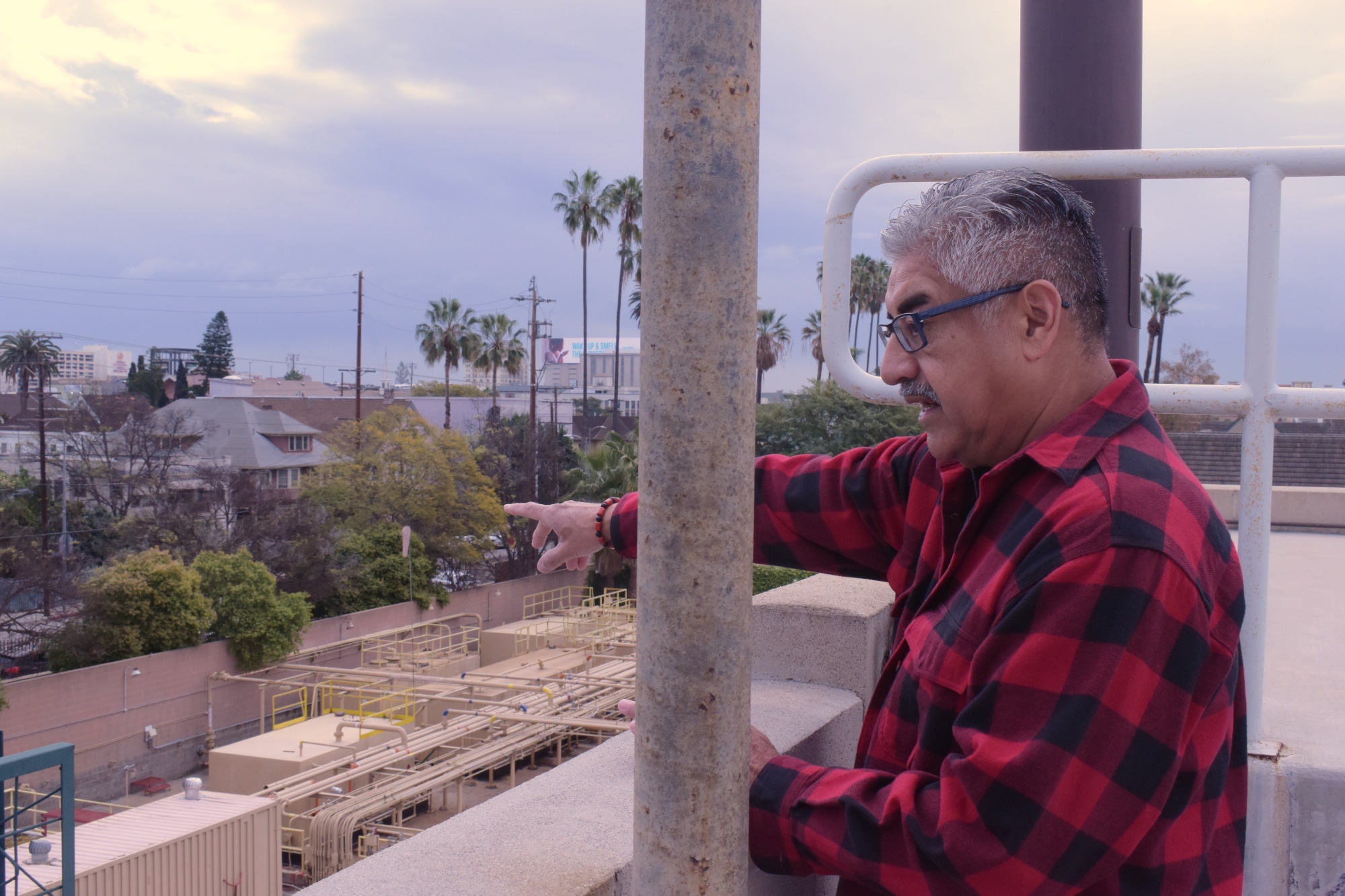[dropcap size=big]A[/dropcap] two-acre lot in South L.A. where 21 oil wells sit idle is a danger to the surrounding neighborhood, according to state documents and several petroleum engineers. But although California officials have known of the risk for over a year, they have not made sure the wells are permanently sealed. The wells are located in University Park, a dense neighborhood of intergenerational Latino families and students at the University of Southern California.
The chief of the California Geologic Energy Management Division (CalGEM), Uduak Joe-Ntuk, called the site unsafe more than a year ago. “The hazards and risks at the facility pose not only a danger to the facility itself, but also the local community,” according to an order from CalGEM in March 2020 that gave the site operator, AllenCo, 30 days to take action.
State officials saw the situation as sufficiently urgent that If the company failed to seal the wells, they were prepared to hire their own contractor to do the job. Yet due to a legal standoff between the city and AllenCo, as well as bureaucratic delays, little has been done yet.
CalGEM told Capital & Main via email that it “continues to closely monitor” the lot and is “very much aware of the urban setting of the site and appropriately concerned.” It said officials are “engaging in regular stakeholder meetings to keep communities informed.”
Eric Witten, a longtime engineer who worked for years at the site, said in an interview that pressure inside the 21 wells “has been building every day” since they were shut off back in 2013, increasing the risk of dangerous leaks.
The chance of springing a leak increases when a well is under pressure but not all wells are.
The stark language about danger has not been shared with neighbors, said Hugo Garcia, campaign coordinator for People Not Pozos (People Not Oil Wells). “Nothing like that has been articulated to the community. If it was, we would be all over it,” he said. “It is very disturbing.”
The Archdiocese of Los Angeles owns the land. Director of Media Relations Adrian Marquez Alarcon said her understanding is that state officials recently inspected the site and found nothing indicating a safety risk to the surrounding neighborhood.
The St. James drill site, also known as the AllenCo Energy site, made headlines beginning a decade ago when nearby residents became sickened by fumes and began organizing. They formed the People Not Pozos movement. After the then-regional chief of the U.S. Environmental Protection Agency, Jared Blumenfeld, visited the site and told the L.A. Times, “We suffered sore throats, coughing, and severe headaches that lingered for hours,” the wells were turned off. Advocates went on to bring scrutiny to all industrial oil operations located close to homes and schools across Los Angeles.
Now, at the St. James site, it seems that success may have traded one set of risks for another.
Tracy Lenz, a petroleum engineer and founding owner of Pecan Tree Oil & Gas, LLC, said people in the industry sometimes get concerned about leaving wells shut off for more than just a few months. These wells have been shut off for more than seven years.
“If that were my well, I would worry about it,” Paul Bommer said.
Think of a well—at its most basic—as a steel pipe going down several thousand feet until it reaches oil or natural gas. When a well is idle, whatever is inside, whether it is oil, gas, or water laced with corrosive chemicals, “is just going to sit there and start eating away at the metal,” Lenz said.
As metal is eaten away, valves and gauges can leak, corrosion can burn a hole in the well pipe or leaks can seep up along the outside of the pipe. Leaks are dangerous because escaping gas can explode or catch fire, the state agency says.
The chance of springing a leak increases when a well is under pressure but not all wells are. For example, with some wells, you can open up the top end of the pipe and nothing comes pouring out. Thick oil might just sit there, several thousand feet down. But the wells at the AllenCo Energy site have been under pressure, according to engineers who have measured them.
On September 13, 2019, CalGEM engineer Eric Zimny visited the site. He got a reading of 950 psi (pounds per square inch) on one well. That was “a lot of pressure to see on an idle well,” according to his testimony in state documents.
Such levels are a concern in the view of another petroleum engineer who teaches oil industry practice at the University of Texas. “If that were my well, I would worry about it,” Paul Bommer said, because 950 psi is easily enough pressure to drive a leak.
When AllenCo owner Clifford E. Peter Allen shut off the pumps that lift oil out of the ground back in November 2013 in the face of community opposition, he was fully expecting to restart the business soon. The company has plowed $8 million into upgrades to make the operation safer and cleaner.
But the regulatory landscape and public sentiment were shifting quickly in California, and the site has never been able to open again.
Some government agencies were working with AllenCo on a restart. Then in 2014, L.A. City Attorney Mike Feuer sued the company over the fumes, seeking permanent closure. AllenCo eventually paid out $1.25 million to settle the case.
The U.S. Environmental Protection Agency also came after AllenCo, saying it had not taken steps to prevent accidental release of extremely hazardous substances.
New, stricter rules and laws concerning drilling practices also came into effect at every level of government – municipal, regional and state.
Then things took an even sharper turn against AllenCo in March 2019. As the city’s petroleum administrator at the time, Uduak-Joe Ntuk wrote to company vice president Timothy James Parker to say the mineral rights lease for three of the 21 wells had expired—not at that moment, but actually years earlier—one year after the company turned off the pumps.
This shift seemed unfair to AllenCo because it had been shelling out money and planning to reopen while unaware that the city had quietly decided that the company didn’t even possess a legal right to operate.
This move by the city also reveals a fact not widely known during the heat of the conflict between AllenCo and its sickened neighbors: Some of the wells run through ground where the City of Los Angeles owns the mineral rights.
The city, as well as hundreds of Angelenos, received royalties for decades until 2013.
The principal beneficiary, though, has been the Catholic Church. That’s because the Archdiocese of Los Angeles owns the two acres together with the adjoining Doheny Campus of Mount Saint Mary’s women’s university. The Archdiocese initially leased the two acres to the Atlantic Richfield Company (ARCO) to drill, as a source of income. Later the operating lease passed to St. James Oil Corporation and then to AllenCo Energy.
Between February 2011 and December 2013, AllenCo paid about $735,000 in rental and royalty payments to the archdiocese, per copies of checks written to “The Roman Catholic Archbishop of Los Angeles” in court filings.
Even misdemeanors carry potential jail time.
“The Archdiocese and the city have profited from this for years,” said Carmen Trutanich.
Trutanich is the former city attorney for Los Angeles. He now represents AllenCo, because last August, the city of Los Angeles charged all three parties—AllenCo, Clifford E. Peter Allen, 88, and Vice President Timothy James Parker, 64—with 25 misdemeanors.
In a case that pits the former city attorney against the current city attorney, Trutanich and his former chief deputy, William W. Carter (who represents AllenCo executive Parker), now face off against deputy city attorney Jessica Brown.
Trutanich and Carter argue that the 2019 lapse or cancellation of the lease means that the city now owns three of the wells, essentially inheriting their problems. Mineral rights holders like the city, however, usually do not own a well. The owner is usually the operator. And the owner bears the cost of permanently sealing a well.
But AllenCo denies it is the owner, its lawyers claiming that its responsibilities ended when its right to operate was taken away.
“My client could walk away right now and say, ‘Not ours,’” Carter said.
That wouldn’t make the criminal charges go away, though. And even misdemeanors carry potential jail time. AllenCo is charged with failing to lay out a plan for permanently sealing the wells. This is an expensive process, likely to cost several million dollars. It involves filling the wells with tons of cement.
Witten, the engineer, said the state is insisting on “killing” the wells in a way that he considers unsafe. In a top kill, workers apply so much pressure that they push the oil, gas and water in the well downward – 8,000 feet in this case. In a dense urban area, “killing those wells with pressure on them is incredibly stupid,” Witten said. “It is too dangerous.”
The state disputes that it is insisting on any unsafe method. In an email, CalGEM agrees that it ordered a top kill “as AllenCo Energy failed to carry out safe depressurization of the wells, resulting in multiple leaks” that were documented and fixed in late 2019.
These technical questions could probably be resolved among engineers and decision makers who have the facts at hand in less than a day, Lenz said.
Alarcon said the Archdiocese is evaluating all options and seeks an alternative use “that is in the best interest of the community and all other stakeholders.”
The City Attorney’s Office declined to comment. Four agencies contacted by Capital & Main – the Los Angeles Fire Department, which has inspected the site; the Los Angeles County Fire Department; the South Coast Air Quality Management District; and the U.S. Environmental Protection Agency — all declined comment, pointing to CalGEM as the most knowledgeable and authoritative agency on the St. James drill site.
AllenCo is appealing the order to permanently close the wells and the facility . The appeal is before a state agency called the Office of Administrative Law. No date has been scheduled.






